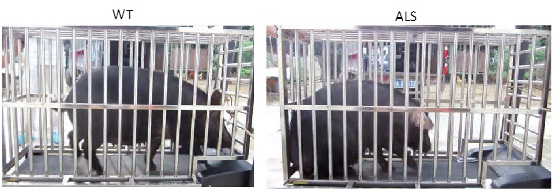Mutations in the human copper/zinc superoxide dismutase 1 (hSOD1) gene cause familial amyotrophic lateral sclerosis (ALS). It remains unknown whether large animal models of ALS mimic more pathological events seen in ALS patients via novel mechanisms.
Recently,a transgenic pig model expressing mutant hSOD1 (G93A) was generated and used to identify the mechanism by which mutant SOD1 causes ALS neuropathology. The transgenic ALS pigs showed hind limb motor defects and motor neuron degeneration in dose- and age-dependent manners. More importantly, transgenic ALS pig brains showed the nuclear inclusions of mutant hSOD1 and the interaction between transgenic SOD1 with the nuclear poly (rC) binding protein (PCBP1), which were not found in transgenic SOD1 mouse brain.
These findings suggest that species-specific targets are key to ALS pathology in large mammals and in humans.
This work results from a collaboration of a few research groups mainly by Guangzhou Institutes of Biomedicine and Health (GIBH) and Institute of Genetics and Developmental Biology (IGDB), Chinese Academy of Sciences. Prof. LAI Liangxue at GIBH and LI Xiao-Jiang at IGDB supervised this project, and the PhD. student WANG Guohao at IGDB shared equal contribution with Dr. YANG Huaqiang at GIBH. This work has been online published on Cell Res. (http:// doi:10.1038/cr.2014.25).

Limb movement defects in hSOD1 transgenic pigs. Representative photos of wild-type (WT) and hSOD1 transgenic (TG-11) pigs at 16 months of age on treadmill. (Image by IGDB)



